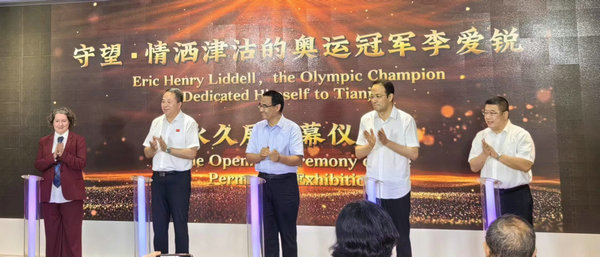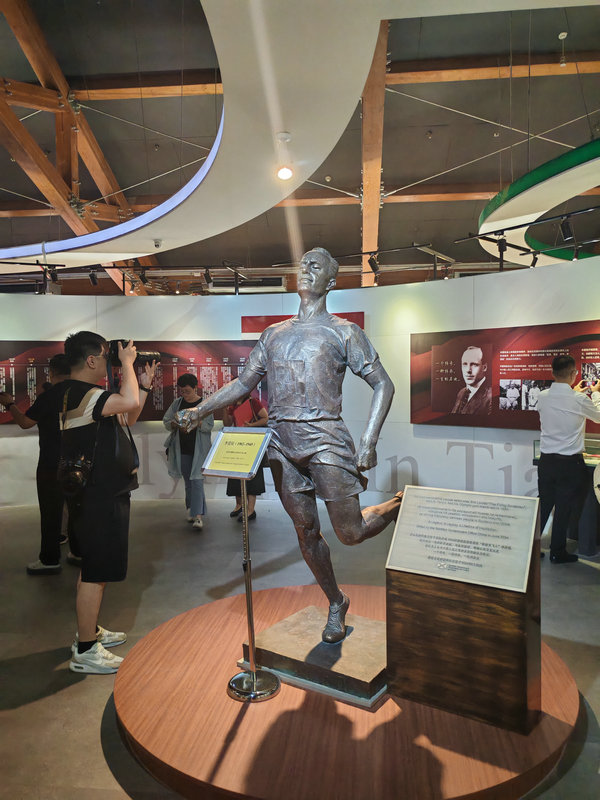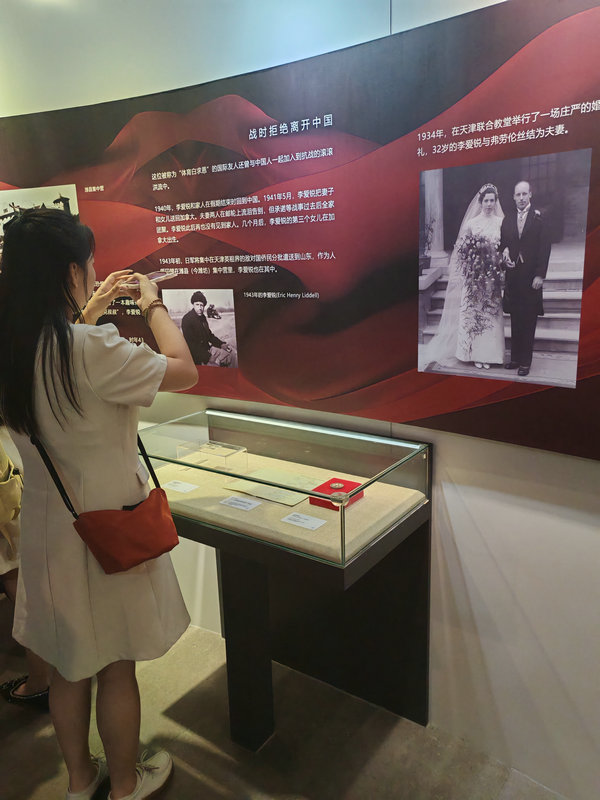

A permanent exhibition commemorating Tianjin native Eric Henry Liddell's gold medal at the 1924 Paris Summer Olympic Games was unveiled at the Tianjin Sports Museum on Tuesday.
Attendees at the ceremony, commemorating the 100th anniversary of Liddell's feat, were moved to tears while watching a documentary video and listening to a letter from his 88-year-old daughter.
A century ago, Liddell, who is widely known in Tianjin as Li Airui, clinched the men's 400-meter gold medal by shattering the world record and becoming the first Olympic champion to have been born in China.
The so-called Flying Scotsman, who was born in the city in 1902, made the courageous decision in 1925 to leave behind the comforts of Great Britain and return to his birthplace.
Amid the tumultuous war years of the mid-20th century, he devoted the prime of his life to the city of Tianjin.
Liddell engaged in educating chemistry students and nurturing sports talent. He actively participated in the renovation of Minyuan Stadium, the country's first sports arena, leaving an enduring mark on the advancement of sports in the municipality.

During the challenging period of the Chinese People's Resistance Against Japanese Aggression (1931-45), Liddell stood firmly with China, offering his utmost assistance to those in dire circumstances. In 1945, at the age of 43, he died from a brain tumor in a Japanese concentration camp in Weixian county of Weifang, Shandong province.
Liddell's story of Olympic glory was immortalized in the 1981 film Chariots of Fire, a globally acclaimed Oscar-winning blockbuster.
"The spirit of Liddell continues to shine brightly today." said Xue Hui, director of the Tianjin Sports Bureau. "The establishment of the permanent exhibition at the Tianjin Sports Museum aims to preserve his legacy forever."
Although Liddell's daughter, Patricia Liddell Russell, 88, could not attend the event because of frail health, she sent written remarks sharing memories of her father and expressing gratitude to the people of Tianjin.
She wrote: "My father loved China and its people. Despite his remarkable success at the Paris Olympics in 1924, and immediately after his graduation from the University of Edinburgh, he returned to China. He taught science to Chinese students at the Tientsin Anglo Chinese College and coached them in athletics.

"Alongside many other foreigners, including over 200 children, he was interned at the Weixian Camp. There, he cared for those in need and was involved in teaching at a school organized within the camp. He taught the children science and even wrote a textbook from memory since none were available. He organized sports activities for the children to keep them happy and help them cope with their frustrations.
"My father cherished Tianjin deeply. He spent more time in Tianjin than in Scotland. His example of self-sacrifice and compassion continues to inspire and benefit many people to this day."
Catriona Radcliffe, head of the Scottish Government Office in China, said, "His exceptional achievements were truly extraordinary, and his athletic prowess was matched by his approach to life, his dedication to helping others and his sense of community spirit. This is why his memory endures and resonates with so many people today. His values of compassion, integrity and passion, and how he embodied them in sports and in his life, continue to inspire."
Xue, the sports bureau director, added: "The establishment of the permanent exhibition aims to inspire more individuals to strive for excellence, face challenges with courage, foster unity and friendship and illuminate the Tianjin sports industry with even greater brilliance in the spirit of 'Faster, Higher, Stronger, Together.'"